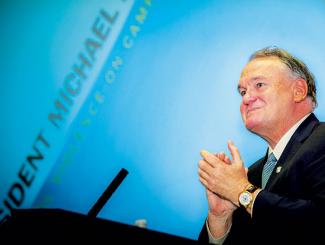“We are following the best practices for addressing campus sexual assault, but it’s not enough,” said Tulane University President Mike Fitts.
“We must shift our focus to prevention. We must innovate, learn from each other, invite new voices to the conversation and adopt a willingness to challenge the status quo.”
Last year, as the results of the climate survey were shared, the Wave of Change campaign was launched to inform and engage the community and to identify effective ways to improve prevention, while changing aspects of our underlying culture that make sexual violence possible.
In fall 2017, Fitts created the Sexual Assault Task Force composed of faculty experts, staff members and students. The task force was charged with obtaining a better understanding of the reasons for sexual violence on college campuses. With this understanding, the group developed evidence-based recommendations for how the problem could be eliminated.
The task force concentrated on four areas:
Undergraduate Sexual Misconduct Prevention: Focusing on issues impacting undergraduates; programs and approaches to prevention of sexual misconduct; issues facing students of color and LGBTQ+ identifying students; and the use of alcohol as a tool of perpetrators.
Graduate Student Sexual Misconduct Prevention: Focusing on issues impacting graduate students; programs and approaches to prevention of sexual misconduct; issues facing student of color and LGBTQ+ identifying students; and dating/domestic violence.
Faculty Sexual Harassment Prevention: Focusing on issues of faculty-on-faculty harassment; faculty-on-student harassment; policies and best practices; and sexual harassment education.
Research & Assessment: Focusing on programmatic measurable outcomes; advancing research on the prevention of sexual misconduct; defining success; and developing a research plan for Tulane.
The conclusions reached by each group have helped inform a path forward to stop sexual violence.


































































